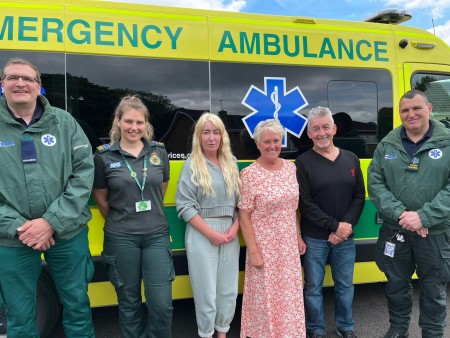The last thing on Liverpool fan Phil Brock’s mind on Sunday 17 December 2023 was having an ambulance called to help him, after suffering a life-threatening heart attack following a collapse in a Nottinghamshire supermarket.
Phil, 70, from Eastwood, Nottingham, today met the team who answered and responded to the emergency call which saved his life. A father of two and grandfather of two, he is immensely thankful for the teamwork from everyone who helped him that day.
Meeting Phil and his family today were ambulance technician Ian Johnson and Paramedic Jon Webb, and Kayleigh Shelbourn, Emergency Medical Advisor, who answered the call on the day.
Phil said “I’ll never forget that day – Liverpool were due to play Manchester United to take top spot in the Premier League. I was in the shop to stock up, before going to Anfield for the match that afternoon.
“I had a dizzy spell in one of the aisles, something I’d experienced a month before, which passed after a short while. This time I started to visualise my way out, as I felt I needed to sit down. Next thing, I came to on the floor, surrounded by people – a trainee nurse and another customer had seen me go down and called for help.
“I now know that I came round briefly, before passing out again, they then put me in the recovery position. At one point I was told by one of the customers that I had stopped breathing, and turned blue for a few moments.
“After Jon and Ian arrived, they got me on a stretcher and onto the ambulance. We were talking and they were doing their checks on me. Although my observations initially appeared ok, they wanted to take me to the Queen’s Medical Centre (QMC) for some further tests.
“On the way to hospital I started having an awful tightening sensation and pains in my chest and I started sweating.
“Jon and Ian quickly identified the symptoms of a heart attack and as we were just arriving at QMC, they got one of the consultants to review my electrocardiogram (ECG) straight away. It was decided to blue light me to city hospital.
“I was so impressed with them. They absolutely had my back. Jon helped manage my pain and really cared for me, while Ian got us to the hospital safely. Within 30 minutes of my arrival, I was having a procedure done to remove a blood clot.
Ambulance crew Ian and Jon said “It’s been incredible to meet Phil again after helping him in December. Witnessing him having his heart attack on our ambulance was obviously concerning, but the circumstances and teamwork which got him there early gave him the best chance of making a full recovery.
“The care of the supermarket staff and the off-duty trainee nurse meant that Phil was helped and supported even before we got there. The liaison between QMC and the Trent Cardiac Centre at City Hospital meant that Phil had no delays in receiving the right care at the right place.
“It’s so important that our service is available for those people like Phil experiencing life-threatening medical emergencies. We’re really pleased he’s doing so well after the event.”
Emergency Medical Advisor Kayleigh said “I’ve really enjoyed meeting Phil and his family today. It’s easy to feel removed from the incidents while working in the control room, so seeing Phil is a reminder of how rewarding working for the ambulance service is.”
A keen walker who does five miles a day, Phil was home three days later and back walking again after two weeks.
He said “In the week, we spend time looking after our granddaughters. I’m just so grateful for everyone, their actions mean I am still here to support and care for my family.”

Further advice
A heart attack is where the supply of blood to the heart is suddenly blocked. A person suffering a heart attack will usually be able to talk and will be awake. Call 999 straight away if you get:
- sudden pain or discomfort in your chest that does not go away.
- the pain spreads to your arms, neck, jaw, stomach or back.
- chest pain and feel sweaty, sick, light-headed or short of breath.
Sometimes confused with a heart attack, a cardiac arrest is when the heart stops pumping blood normally. A person in cardiac arrest will be unresponsive and won’t be breathing, or not breathing normally.
Call 999 and you will be guided on how to do cardiopulmonary resuscitation (CPR). Giving early CPR is vital to give the person the best possible chance of survival. You can learn how to do CPR any time.
You can find information about the jobs and volunteer opportunities available at East Midlands Ambulance Service on our website.